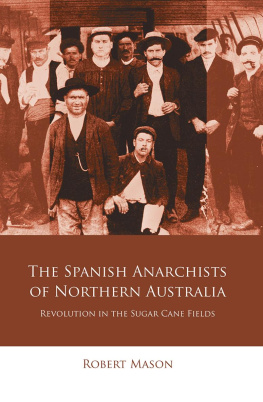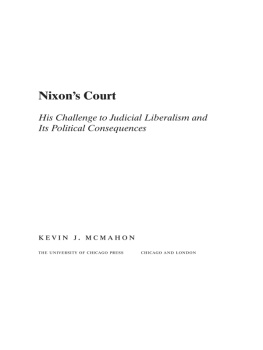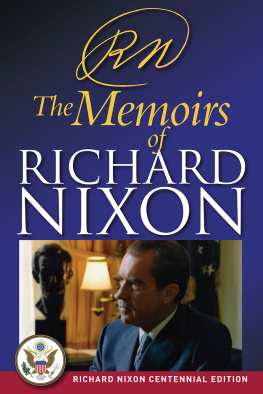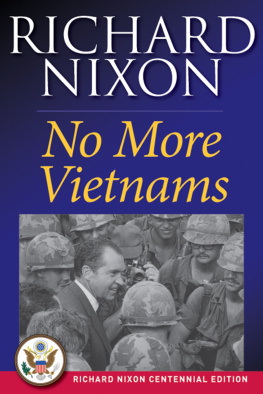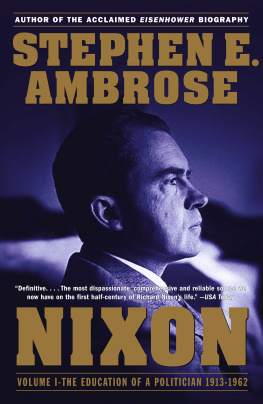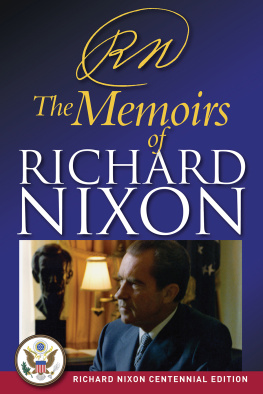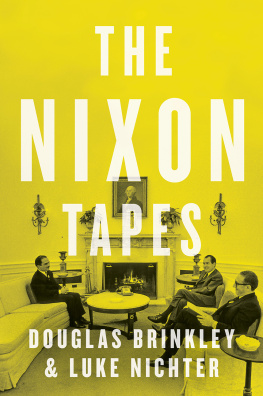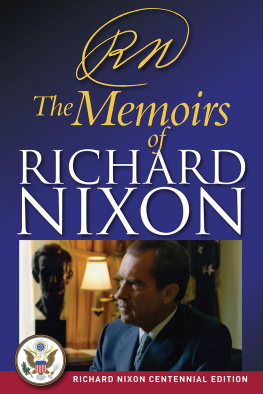Acknowledgments
In completing this book, I am particularly happy to have an opportunity to express my thanks to those who have so generously helped me in my work on it. I owe an enormous debt of gratitude to Byron Shafer, whose excellence as an adviser and mentor I cannot overstate. Tony Badger, Nigel Bowles, Gareth Davies, Nelson Polsby, Sukhdev Sandhu, and Marc Stears all read the entire manuscript, and their comments were immensely beneficial, as were those of the anonymous reviewers. I have also been very lucky to receive advice, assistance, and encouragement from many others, including Sybill Bidwell, Richard Fenno, Anupam Gupta, Paul Martin, John Mason, Sarah Mason, David Mayhew, Bent Nielsen, Richard OLeary, Jacqui Pearse, Tom Perrett, Allen Pitt, John Rowett, Petra Schleiter, Rebecca Short, and Robert Singh. Of great benefit to my research was the guidance of librarians and archivists at Rhodes House Library in Oxford, the Nixon Presidential Materials Project at the National Archives, the Gerald R. Ford Library, and the Manuscripts Division at the Library of Congress. I am most fortunate to work among a supportive and generous group of historians at Edinburgh, and my fellow AmericanistsFrank Cogliano, Alan Day, Owen Dudley Edwards, and Rhodri Jeffreys-Joneshave been especially dependable and valuable sources of advice and help. At Edinburgh I have learned much, too, about this topic from my students. For their financial support, I am grateful to the British Academy; Nuffield College, Oxford; the University of Edinburgh; the Gerald R. Ford Foundation; and the Eisenhower World Affairs Institute. The staff at the University of North Carolina Press, notably Charles Grench, Amanda McMillan, Paula Wald, and, until his departure, Lewis Bateman, have guided this book toward publication in an encouraging as well as expert way, and the contribution of copyeditor Ellen Goldlust-Gingrich was valuable. To all those who have provided in countless ways help and supportabsolutely essential during this projectI am deeply grateful.
RICHARD NIXON
and the Quest for
a New Majority
Introduction
Richard Nixon and the Quest for a New Majority is the study of an effort to shift the mass politics of the United States at a potentially crucial moment in recent history. The late 1960s and early 1970s represented a period of upheaval in American society, when opportunities for political change seemed more substantial than at any time since the Great Depression. This is the story of bold political ambition in response to the perception of a great political possibility.
For a generation, Democrats had dominated national politics. This era of Democratic dominance began with the economic crisis that took hold under Herbert Hoover, a crisis that discredited the Republican Party in the eyes of many Americans. Franklin Roosevelt then mobilized an electoral majority for the Democratic Party in support of his administrations New Deal. This majority included many of Americas less privileged people, and the Roosevelt coalition had remarkable endurance. In the years that followed, Republicans won no more than passing success in elections for the presidency and for Congress. Their moments of triumph were few and brief. In both 1946 and 1952, they took control of Congress, but in each case for two years only; Dwight Eisenhower won the two presidential elections of the 1950s but did so because of his public standing as a great leader rather than because of his Republican identity. As a political entity designed to win elections, the Republican Party was a disaster. More Americans consistently preferred the Democratic Party. Following Hoover came a generation that rarely offered Republicans anything but frustration.
Decades after Roosevelts defeat of Hoover in 1932, prospects at last looked brighter for the Republican Party. At the end of the 1960s and the beginning of the 1970s, many people believed that this record of disappointment was about to change, that the country stood on the verge of a conservative realignment that would completely transform American politics. A new generation of Republican success might replace the generation of Democratic dominance. Richard Nixon and the Quest for a New Majority looks at the reasons why these beliefs became widespread, investigating how a Republican administration responded to this perception of a truly significant political opportunity.
Richard Nixon, the figure at the center of this work, became president at this time of opportunity and developed a plan to exploit it. Because of his achievements and his failings, Nixon was one of the most important politicians of his century. Achieving national prominence not long after his election to the House of Representatives in 1946, he remained on the political stage for the rest of his life and played a key role in many of the principal events and developments of postWorld War II American history. When Nixon died in 1994, Senator Robert J. Dole, a Republican from Kansas, exaggerated perhaps only slightly when he commented that the second half of the twentieth century [would] be known as the age of Nixon.
Nixons idiosyncrasies as a politician would influence his handling of what he saw as a historic opportunity for Republicans. Some of these quirks equipped him well for the task, which was to disrupt the Democratic coalition by reaching out to a larger constituency. Although as a Republican he represented the party of privilege, he harbored a sense of exclusion from privilege and instead felt a sense of identity with ordinary Americans. This identity was absolutely at odds with the dominant image of his party and represented an asset in seeking to improve its fortunes. Ray Price, a longtime aide and Nixon sympathizer, later observed to journalist Tom Wicker that Nixons pretense was to be less than he wasless thoughtful, less introverted, less skeptical and analytical, less cerebralto present himself deliberately as an Average American: patriotic, conventionally religious and responsible, gregarious, sports-loving, hardworking and hard-nosed. According to Wicker, this pretense often succeeded, investing Nixon with a remarkable appeal to American voters. But there was a darker edge to this connection between politician and people, Wicker noted; it was clouded by a condescending and contemptuous attitude toward the commonality of the American people. Nixon did not believe that the high ground was the place to succeed in politics. Among the more ubiquitous politicians of his generation, he was unarguably the most controversial. To his opponents, he was Tricky Dick almost from the start.
Nixon rarely strayed far from the campaign trail, where he learned lessons that he remembered when president. He started to master electoral politics when campaigning for the House in 1946 and then for the Senate in 1950. In these races, he learned the value of aggressive partisan attacks, identifying his popular opponents with damagingly unpopular policies. Nixons anticommunism defeated first Jerry Voorhis and then Helen Gahagan Douglas. In achieving these victories, Nixon also learned the importance of reaching out to Democratic and independent voters, an essential tactic in his home state of California, where, as in the nation as a whole at the time, Republican supporters constituted a minority within the electorate. Both of these lessons proved important when Nixon looked for a new majority as president.


